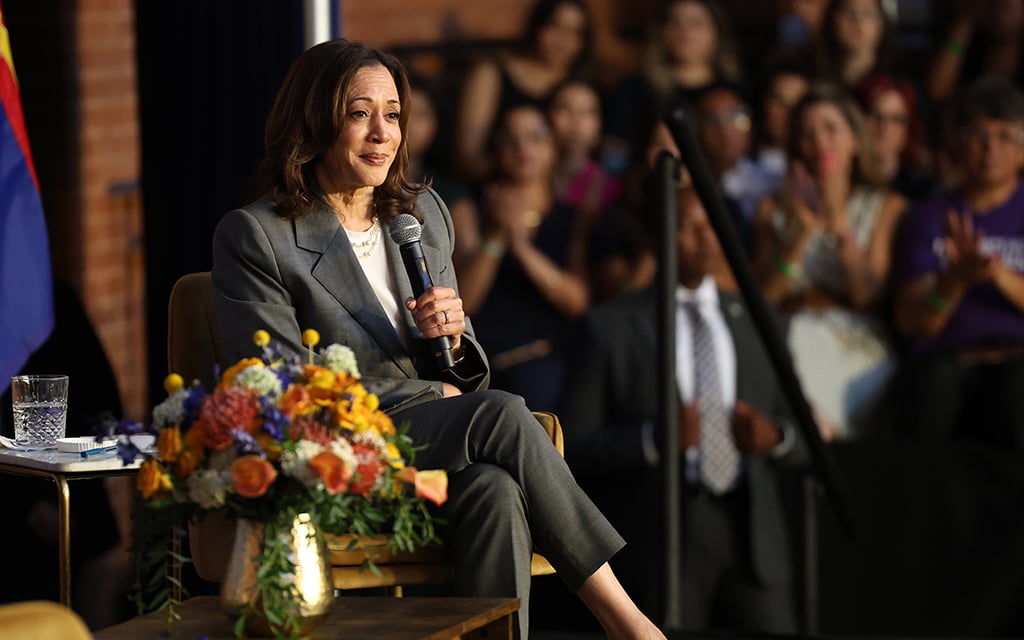Marking two years since the Supreme Court struck down federal abortion rights, protesters marched on the court Monday, and Vice President Kamala Harris stumped in Phoenix to put a spotlight on the tussle over abortion in Arizona.
“Our work right now is absolutely directly going to affect the people of Arizona, the people of our country, but will have an impact on people around the world. That’s what’s in our hands right now,” Harris said at a reproductive freedom campaign event in Phoenix.
Event organizers said a crowd of over 400 people came to see the vice president speak on reproductive freedom at Warehouse 215.
States became battlegrounds for abortion rights after the Dobbs v. Jackson Women’s Health Organization ruling in 2022 ended the constitutional protections in place since 1973.
With states no longer constrained by Roe v. Wade, restrictions exploded. After the fall of Roe, Arizona imposed a 15-week abortion ban, far earlier than the point of fetal viability. The ban, which is the current law, does not have an exception in cases of rape or incest but includes an exception for medical emergencies.
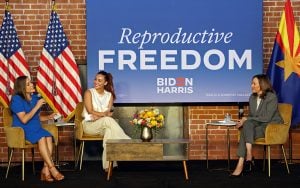
From left, Arizona Corporation Commissioner Anna Tovar, actress Francia Raísa, and Vice President Kamala Harris discuss reproductive rights in Phoenix on June 24, 2024. (Photo by Stella Subasic/Cronkite News)
“The idea that the so-called leaders would say to a survivor of a crime of violence to their body, a survivor of a violation of their body, that that survivor has no right or authority to make a decision about what happens to their body next, that’s immoral. And that’s what’s happening in our country,” Harris said.
In April, the Arizona Supreme Court ruled that a near-total ban from 1864 was enforceable once Roe fell, but Gov. Katie Hobbs signed a repeal bill in May that the Legislature quickly sent to her desk.
The 1864 ban fueled a movement calling for a constitutional amendment to cement abortion rights. Arizona voters will likely see a ballot initiative in November that would codify the right to abortion through fetal viability, about 24 weeks.
In a May poll of Arizona voters, Noble Predictive Insights found that support for the ballot initiative is almost evenly split with 41% opposed, 41% in support and 18% undecided.
The issue has the potential to drive up turnout. A KFF survey found that roughly half of female voters in Arizona would be more motivated to vote if the initiative appeared on the ballot.
“It’s a motivating factor for me, among many others,” said Mya Vallejo, a 23-year-old student at Arizona State University from Tucson who attended the Harris event in Phoenix. “I’m sure for people in my life that maybe wouldn’t have voted and haven’t voted in the past, when you tell them that their reproductive health care is on the line, they’re like, ‘Better go vote.’”
Cathi Herrod, president of the Center for Arizona Policy, disagreed, saying that Democrats believe abortion will “send everyone to the polls,” but Arizonans are “most concerned about border security and gas, rent and groceries. That’s what Arizona voters are going to be voting on.”
Most states have some abortion restrictions at various stages of pregnancy, and Democrats have enthusiastically latched onto the issue in the 2024 campaigns.
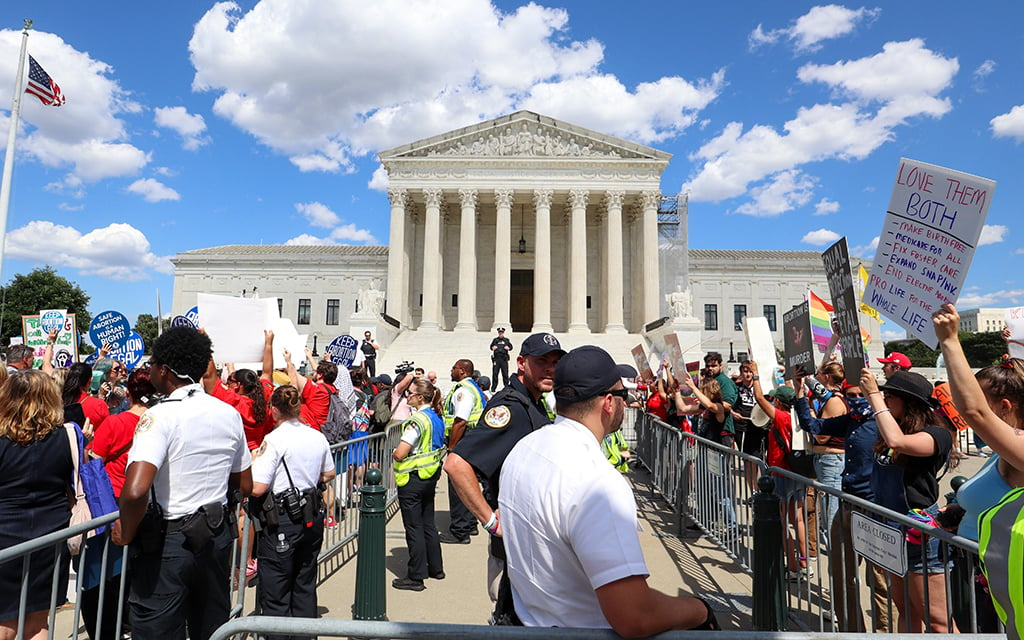
Abortion rights and anti-abortion protesters are separated by barriers at the Supreme Court in Washington, D.C., on June 24, 2024. (Photo by Morgan Kubasko/Cronkite News)
“Women across the country are beginning to relive the pre-Roe horror stories, and it doesn’t matter if they’re Democrats or Republicans or independents – all women, they’re now forced to carry life-threatening pregnancies to term,” Democratic National Committee Chair Jaime Harrison said Monday on a call with news media.
The Women’s March Network orchestrated a nationwide “women’s strike” with the slogan “We Won’t Go Back.” Youth organizations led many of the local demonstrations, the group said.
In Arizona, about 200 people signed up for a Monday morning demonstration in Phoenix advocating for abortion access.
In Washington, hundreds of people gathered at the Supreme Court on a steaming afternoon to show support for abortion rights, along with a smaller number of anti-abortion demonstrators.
Speakers offered testimonials and calls to action, interrupted by anti-abortion chants. Anti-abortion protesters chanted “not your body, not your choice,” while abortion rights protesters chanted “our body, our choice.”
Slogans also clashed. Abortion rights organizations passed out blue signs saying “keep abortion legal,” and anti-abortion organizations passed out purple signs saying “stop abortion extremism.”
Police escorted some anti-abortion protesters out of the crowd, and after about an hour, officers erected barriers to keep demonstrators on opposite sides of the issue apart. The police presence grew through the three-hour event.
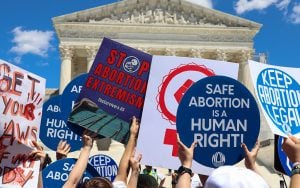
Abortion rights and anti-abortion protesters hold up signs at the Supreme Court in Washington, D.C., on June 24, 2024. (Photo by Morgan Kubasko/Cronkite News)
“There’s really a push from conservative forces to roll back rights and protections for women and to really take us back to another time in our history,” said Tamika Middleton, managing director for Women’s March. “We have to get out, we have to take action to ensure that we won’t go back to those.”
Numerous attendees at both the protests in Washington and the Harris reproductive freedom campaign event in Phoenix emphasized the importance of the November elections for the future of abortion rights.
“I am terrified about this election,” said Brittney Donovan, an abortion rights supporter from Baltimore. “If (Donald) Trump wins, women’s rights are gone.”
She wasn’t much more optimistic about abortion rights if President Joe Biden wins reelection.
“I definitely see the Trump extremists coming out violently … so it’s terrifying either way,” she said.
Harris urged people to go out and vote at the Phoenix event, saying, “This is the one when we have such fundamental freedoms that are being attacked in our country. This is a moment where none of us can sit this out.”
Anti-abortion advocates saw the two-year anniversary of the Dobbs ruling as something to celebrate instead of mourn.
“We are really celebrating the overturn of Roe v. Wade,” said Constance Becker, the 20-year-old executive coordinator of Progressive Anti-Abortion Uprising. “We think that the unborn are deserving of all the same rights that every other person is and we came out here to advocate for them.”
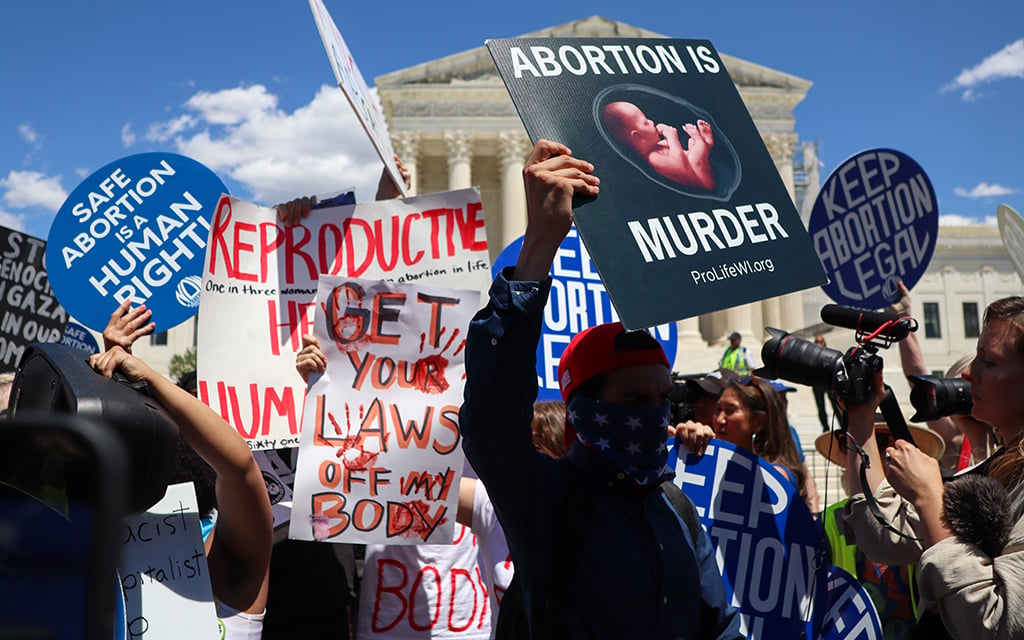
Abortion rights activists and opponents face off at the Supreme Court in Washington, D.C., on June 24, 2024. (Photo by Morgan Kubasko/Cronkite News)
Other abortion rights supporters voiced discomfort with state laws that limit abortion access and similar efforts to limit reproductive freedoms, including in vitro fertilization and contraception.
“Really it kind of creeps me out, honestly, that we’re here in 2024 now, and there are people that are trying to limit IVF,” said Danielle Barbera, a 39-year-old project manager from Virginia. “No one in the government should be able to enforce that on anyone .… It’s almost saying, ‘I don’t trust you with what you do with your body and so we’re going to take those rights away from you.’ “
Vallejo, who said she has been on birth control since she was 14, worried that access to contraception might also be on the table.
“It scares me,” she said. “It was so horrifying and disheartening to see that conservatives in the state legislature are so passionately advocating for a bill that is geriatric and shouldn’t even be in the conversation right now.”
Before flying to Arizona, Harris sounded similar themes for reproductive freedoms while campaigning at the University of Maryland, just outside Washington, D.C.
In both Maryland and Arizona, she pinpointed Trump as the one who overturned Roe v. Wade, citing his appointment of three justices who voted to overturn Roe.
Harris also emphasized that Biden, her running mate, would sign a bill to protect abortion nationally if given the opportunity.


